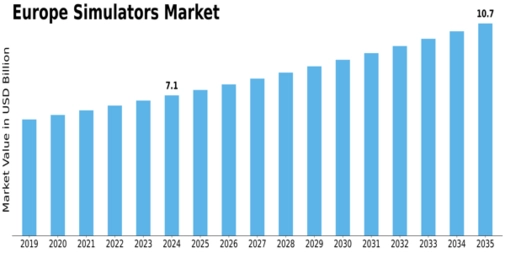-
Новости
- ECOSYSTEM
- ИССЛЕДОВАТЬ
-
Страницы
-
Группы
-
Мероприятия
-
Статьи пользователей
Technological Advancements Power Growth in the Europe Simulators Market

Market Outlook
The European simulators space is projected to grow from about USD 7.08 billion in 2024 to roughly USD 10.7 billion by 2035, at a CAGR of ~3.83%. Although the growth rate may appear moderate compared to some high-growth markets, the base size and the critical role of simulation across sectors make this market compelling.
Industry Overview
Simulation training has become indispensable across commercial and military applications. In Europe, training needs are evolving: airlines need more pilots, armed forces require more realistic mission rehearsal, healthcare and automotive sectors adopt simulation, and industrial plants rely on digital twins for training. These pressures drive demand for high-fidelity simulators that replicate complex tasks in safe, repeatable environments.
Key Players
Leading firms active in Europe include Thales Group, Siemens AG, Boeing Company, Kongsberg Gruppen ASA, Northrop Grumman Corporation, FlightSafety International, and CAE Inc. Each brings unique strengths—from aerospace expertise to industrial simulation capability—which they leverage through partnerships, acquisitions and product innovation.
Segmentation & Growth Opportunities
- Application: The split between Commercial Training and Military Training is important. As the report notes, rising defence spending in Europe boosts military simulation uptake, while commercial sectors demand training for aviation, automotive, shipbuilding and other industries.
- Solution: Products (hardware simulators, VR/AR systems) and Services (training programmes, maintenance, software) both grow, with services becoming more significant as customers adopt simulation as a training-as-a-service model.
- Platforms/Types/Techniques: Airborne platforms have long been dominant, but land and maritime simulators (for vehicles, rail, ships) are gaining ground. Also, Full Flight Simulators and Flight Training Devices remain core, yet gaming-simulation and synthetic environment techniques offer newer pathways.
Why This Matters
For training organisations, government agencies and industry players, the Europe simulator market offers scalable, cost-efficient ways to upskill personnel, manage risk and comply with regulations. As Europe continues to transform digitally and faces talent shortages, simulation becomes a strategic enabler.
Conclusion
In short, the Europe simulators market is not just about hardware or gimmicks — it’s about enabling capability, safety and productivity. Organisations that embrace simulation solutions will likely gain a competitive edge in training outcomes, operational readiness and cost-effectiveness.
- Art
- Causes
- Crafts
- Dance
- Drinks
- Film
- Fitness
- Food
- Игры
- Gardening
- Health
- Главная
- Literature
- Music
- Networking
- Другое
- Party
- Religion
- Shopping
- Sports
- Theater
- Wellness


